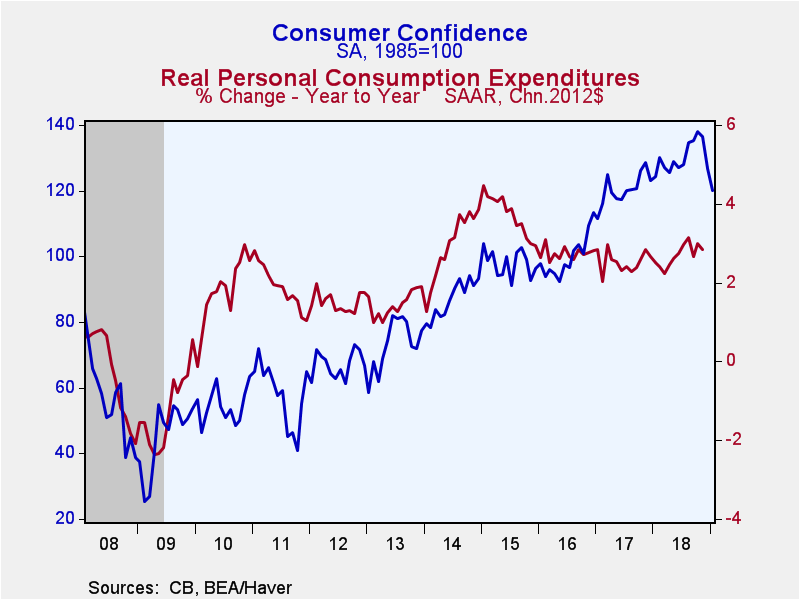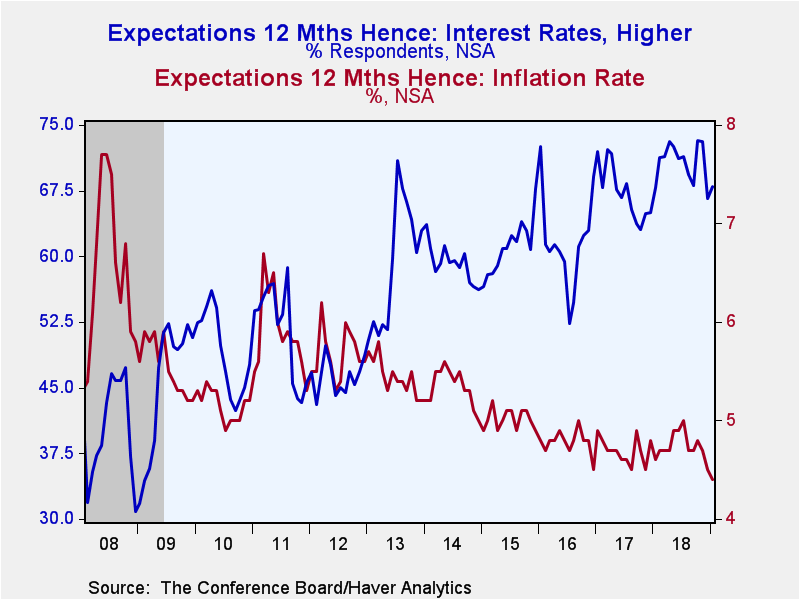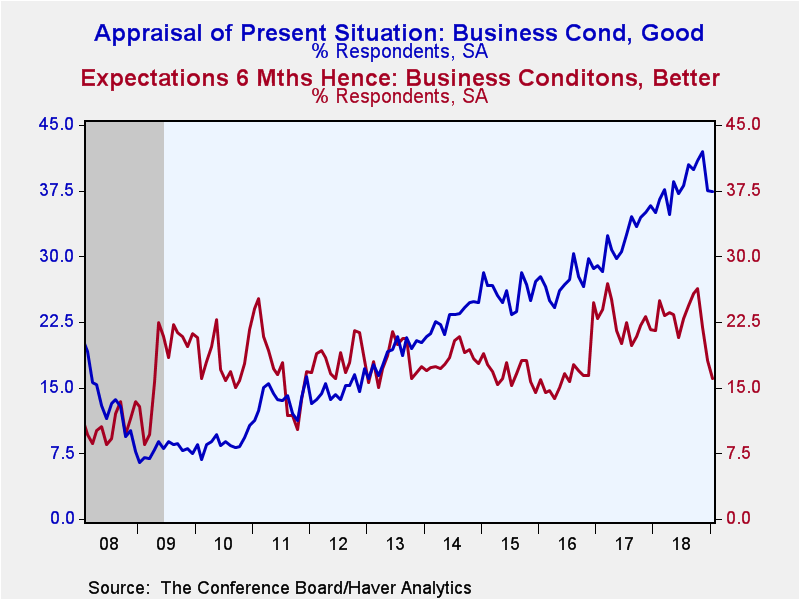 Global| Jan 29 2019
Global| Jan 29 2019U.S. Consumer Confidence Deteriorates, Led by Bleaker Expectations
by:Tom Moeller
|in:Economy in Brief
Summary
The Conference Board Consumer Confidence Index deteriorated 5.1% to 120.2 during January (-3.3% y/y) from 126.6 in December, revised from 128.1. It was the lowest confidence level since July 2017, down 12.8% from the peak just three [...]
The Conference Board Consumer Confidence Index deteriorated 5.1% to 120.2 during January (-3.3% y/y) from 126.6 in December, revised from 128.1. It was the lowest confidence level since July 2017, down 12.8% from the peak just three months ago. Expectations had been for a reading of 124.5 in the Action Economics Forecast Survey. The indexes in the report are based on 1985=100. During the past 10 years, there has been a 69% correlation between the level of consumer confidence and the y/y change in monthly real PCE.
Leading the overall decline was a 10.6% drop (-16.1% y/y) in the expectations component to the lowest level since October 2016. This measure was down by roughly one-quarter during the last three months. In contrast, the reading of confidence in current conditions eased just 0.2% (+9.6% y/y) and has moved just 1.9% lower since the August peak.
The decline in the expectations component was paced by a collapse in the business conditions reading, where just 16.0% of respondents expected an improvement, down ten points in the last three months. Expectations for improvement in the labor market soured to a 2016 low, down sharply in the last three months. Rounding out the deterioration in expectations was a collapse in the percentage of respondents expecting an improvement in income.
The deterioration in the reading of current economic conditions was led by a lessened 37.4% of respondents who felt that business conditions were good. That remained up, however, during the last twelve months. The labor market was deemed good as a higher 46.6% of respondents felt that jobs were plentiful, just off the 19-year high. Jobs were viewed as hard to get by just 12.9% of respondents, down from nearly 50% at the 2009 high.
The expected inflation rate in twelve months declined to 4.4%, the lowest reading since 2005 and down from the 5.0% high registered last July. Roughly two-thirds of respondents expected the recent rise in interest rates to continue, although that percentage was down slightly from the peak registered three months ago. A reduced one percent of respondents planned to buy a new home and a greatly lessened 47.7% planned to buy a major home appliance.
This month's deterioration in overall confidence was greatest amongst individuals aged 35-54 years old. Their confidence fell to nearly a two-year low and was down sharply in the last three months. Confidence amongst individuals under age 35 also fell sharply. Confidence amongst individuals over age 55 held fairly steady m/m after falling sharply at yearend.
The Consumer Confidence data are available in Haver's CBDB database. The total indexes appear in USECON, and the market expectations are in AS1REPNA.
Do Longer Expansions Lead to More Severe Recessions? from the Federal Reserve Bank of Cleveland is available here.
| Conference Board (SA, 1985=100) | Jan | Dec | Nov | Jan Y/Y % | 2018 | 2017 | 2016 |
|---|---|---|---|---|---|---|---|
| Consumer Confidence Index | 120.2 | 126.6 | 136.4 | -3.3 | 130.1 | 120.5 | 99.8 |
| Present Situation | 169.6 | 169.9 | 172.7 | 9.6 | 164.8 | 144.8 | 120.3 |
| Expectations | 87.3 | 97.7 | 112.3 | -16.1 | 107.0 | 104.3 | 86.1 |
| Consumer Confidence By Age Group | |||||||
| Under 35 Years | 124.9 | 129.5 | 143.2 | -2.7 | 133.7 | 130.2 | 122.4 |
| Aged 35-54 Years | 120.2 | 135.9 | 130.1 | -5.6 | 132.2 | 123.5 | 106.2 |
| Over 55 Years | 117.0 | 117.2 | 137.6 | -1.7 | 126.3 | 112.9 | 84.6 |
Tom Moeller
AuthorMore in Author Profile »Prior to joining Haver Analytics in 2000, Mr. Moeller worked as the Economist at Chancellor Capital Management from 1985 to 1999. There, he developed comprehensive economic forecasts and interpreted economic data for equity and fixed income portfolio managers. Also at Chancellor, Mr. Moeller worked as an equity analyst and was responsible for researching and rating companies in the economically sensitive automobile and housing industries for investment in Chancellor’s equity portfolio. Prior to joining Chancellor, Mr. Moeller was an Economist at Citibank from 1979 to 1984. He also analyzed pricing behavior in the metals industry for the Council on Wage and Price Stability in Washington, D.C. In 1999, Mr. Moeller received the award for most accurate forecast from the Forecasters' Club of New York. From 1990 to 1992 he was President of the New York Association for Business Economists. Mr. Moeller earned an M.B.A. in Finance from Fordham University, where he graduated in 1987. He holds a Bachelor of Arts in Economics from George Washington University.
More Economy in Brief
 Global| Feb 05 2026
Global| Feb 05 2026Charts of the Week: Balanced Policy, Resilient Data and AI Narratives
by:Andrew Cates










